Business Law: Analysis of ADR Methods in the United States
VerifiedAdded on 2020/04/21
|6
|1460
|351
Report
AI Summary
This report examines Alternative Dispute Resolution (ADR) methods within the context of U.S. business law, focusing on mediation, arbitration, and negotiation. It defines each method, highlighting the roles of arbitrators and mediators, and the processes involved. The report provides a comparative analysis, outlining the advantages and disadvantages of each ADR approach, including cost-effectiveness, speed, and enforceability of decisions. It also addresses the suitability of each method for different types of disputes, considering factors like complexity, urgency, and the relationship between parties. The report emphasizes how corporate managers can prepare for ADR, advocating for incorporating ADR clauses in agreements to mitigate litigation risks. Finally, it references several scholarly articles to support its analysis of each ADR method, their strengths, and weaknesses, and their applicability in various business scenarios.

Running head: BUSINESS LAW
Business law
Name of the Student
Name of the University
Author Note
Business law
Name of the Student
Name of the University
Author Note
Paraphrase This Document
Need a fresh take? Get an instant paraphrase of this document with our AI Paraphraser
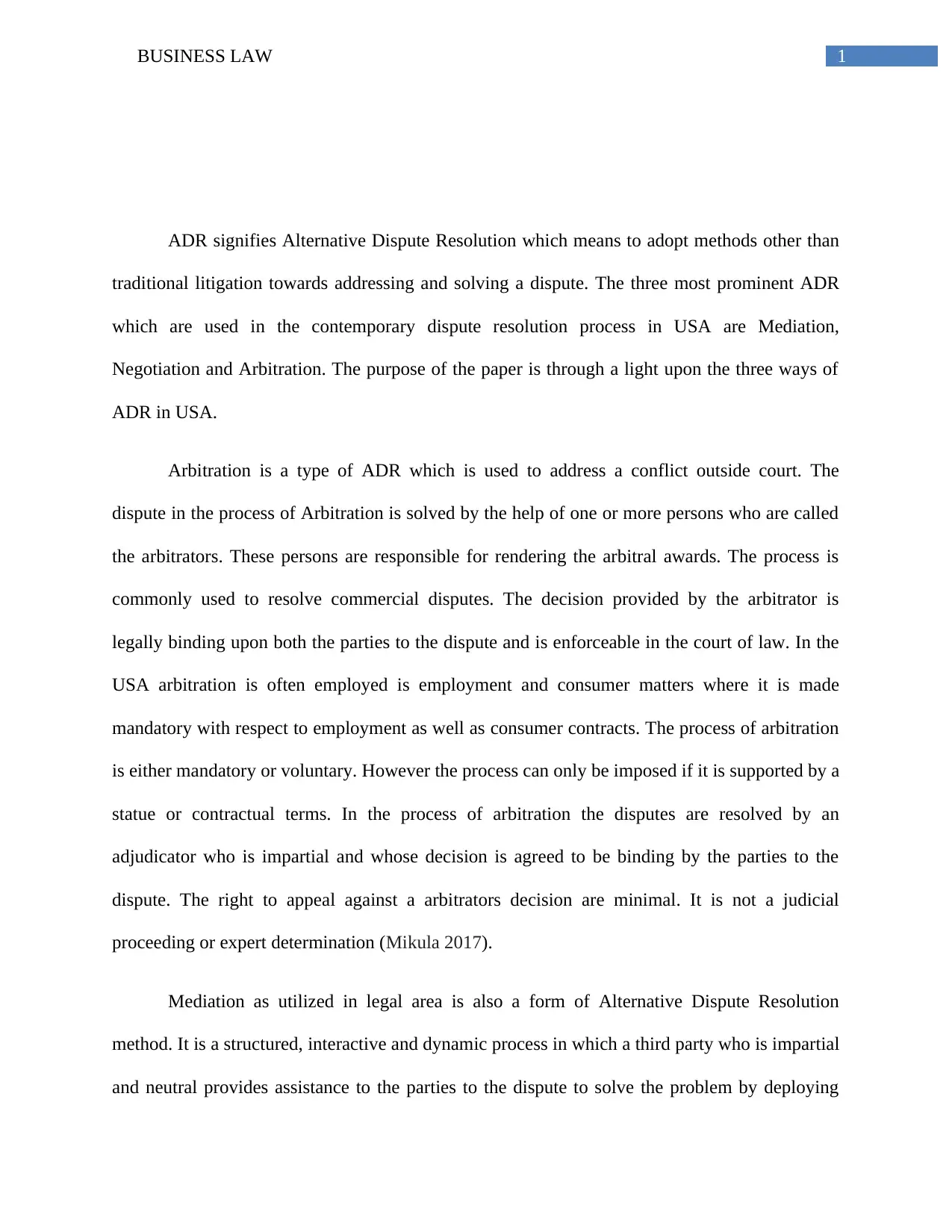
1BUSINESS LAW
ADR signifies Alternative Dispute Resolution which means to adopt methods other than
traditional litigation towards addressing and solving a dispute. The three most prominent ADR
which are used in the contemporary dispute resolution process in USA are Mediation,
Negotiation and Arbitration. The purpose of the paper is through a light upon the three ways of
ADR in USA.
Arbitration is a type of ADR which is used to address a conflict outside court. The
dispute in the process of Arbitration is solved by the help of one or more persons who are called
the arbitrators. These persons are responsible for rendering the arbitral awards. The process is
commonly used to resolve commercial disputes. The decision provided by the arbitrator is
legally binding upon both the parties to the dispute and is enforceable in the court of law. In the
USA arbitration is often employed is employment and consumer matters where it is made
mandatory with respect to employment as well as consumer contracts. The process of arbitration
is either mandatory or voluntary. However the process can only be imposed if it is supported by a
statue or contractual terms. In the process of arbitration the disputes are resolved by an
adjudicator who is impartial and whose decision is agreed to be binding by the parties to the
dispute. The right to appeal against a arbitrators decision are minimal. It is not a judicial
proceeding or expert determination (Mikula 2017).
Mediation as utilized in legal area is also a form of Alternative Dispute Resolution
method. It is a structured, interactive and dynamic process in which a third party who is impartial
and neutral provides assistance to the parties to the dispute to solve the problem by deploying
ADR signifies Alternative Dispute Resolution which means to adopt methods other than
traditional litigation towards addressing and solving a dispute. The three most prominent ADR
which are used in the contemporary dispute resolution process in USA are Mediation,
Negotiation and Arbitration. The purpose of the paper is through a light upon the three ways of
ADR in USA.
Arbitration is a type of ADR which is used to address a conflict outside court. The
dispute in the process of Arbitration is solved by the help of one or more persons who are called
the arbitrators. These persons are responsible for rendering the arbitral awards. The process is
commonly used to resolve commercial disputes. The decision provided by the arbitrator is
legally binding upon both the parties to the dispute and is enforceable in the court of law. In the
USA arbitration is often employed is employment and consumer matters where it is made
mandatory with respect to employment as well as consumer contracts. The process of arbitration
is either mandatory or voluntary. However the process can only be imposed if it is supported by a
statue or contractual terms. In the process of arbitration the disputes are resolved by an
adjudicator who is impartial and whose decision is agreed to be binding by the parties to the
dispute. The right to appeal against a arbitrators decision are minimal. It is not a judicial
proceeding or expert determination (Mikula 2017).
Mediation as utilized in legal area is also a form of Alternative Dispute Resolution
method. It is a structured, interactive and dynamic process in which a third party who is impartial
and neutral provides assistance to the parties to the dispute to solve the problem by deploying
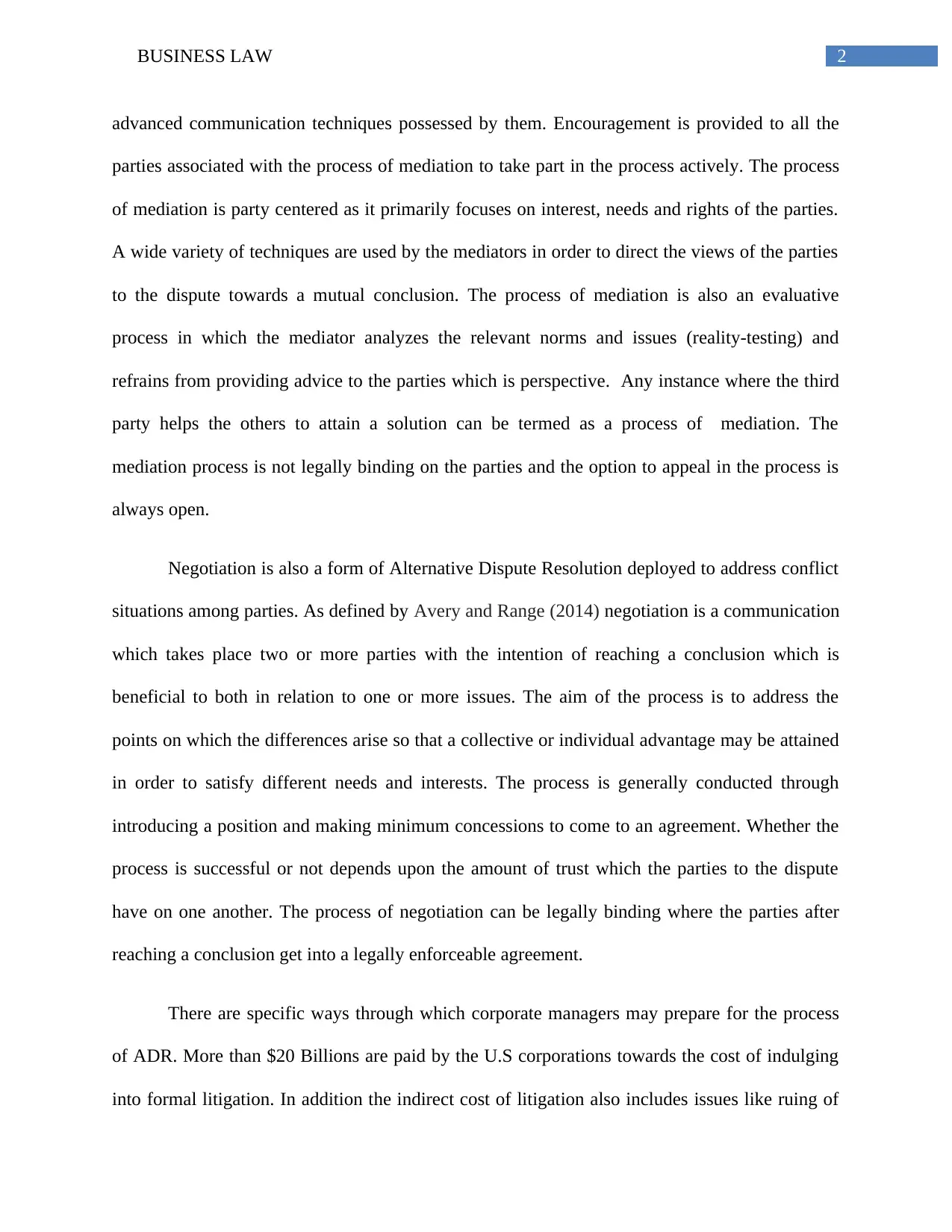
2BUSINESS LAW
advanced communication techniques possessed by them. Encouragement is provided to all the
parties associated with the process of mediation to take part in the process actively. The process
of mediation is party centered as it primarily focuses on interest, needs and rights of the parties.
A wide variety of techniques are used by the mediators in order to direct the views of the parties
to the dispute towards a mutual conclusion. The process of mediation is also an evaluative
process in which the mediator analyzes the relevant norms and issues (reality-testing) and
refrains from providing advice to the parties which is perspective. Any instance where the third
party helps the others to attain a solution can be termed as a process of mediation. The
mediation process is not legally binding on the parties and the option to appeal in the process is
always open.
Negotiation is also a form of Alternative Dispute Resolution deployed to address conflict
situations among parties. As defined by Avery and Range (2014) negotiation is a communication
which takes place two or more parties with the intention of reaching a conclusion which is
beneficial to both in relation to one or more issues. The aim of the process is to address the
points on which the differences arise so that a collective or individual advantage may be attained
in order to satisfy different needs and interests. The process is generally conducted through
introducing a position and making minimum concessions to come to an agreement. Whether the
process is successful or not depends upon the amount of trust which the parties to the dispute
have on one another. The process of negotiation can be legally binding where the parties after
reaching a conclusion get into a legally enforceable agreement.
There are specific ways through which corporate managers may prepare for the process
of ADR. More than $20 Billions are paid by the U.S corporations towards the cost of indulging
into formal litigation. In addition the indirect cost of litigation also includes issues like ruing of
advanced communication techniques possessed by them. Encouragement is provided to all the
parties associated with the process of mediation to take part in the process actively. The process
of mediation is party centered as it primarily focuses on interest, needs and rights of the parties.
A wide variety of techniques are used by the mediators in order to direct the views of the parties
to the dispute towards a mutual conclusion. The process of mediation is also an evaluative
process in which the mediator analyzes the relevant norms and issues (reality-testing) and
refrains from providing advice to the parties which is perspective. Any instance where the third
party helps the others to attain a solution can be termed as a process of mediation. The
mediation process is not legally binding on the parties and the option to appeal in the process is
always open.
Negotiation is also a form of Alternative Dispute Resolution deployed to address conflict
situations among parties. As defined by Avery and Range (2014) negotiation is a communication
which takes place two or more parties with the intention of reaching a conclusion which is
beneficial to both in relation to one or more issues. The aim of the process is to address the
points on which the differences arise so that a collective or individual advantage may be attained
in order to satisfy different needs and interests. The process is generally conducted through
introducing a position and making minimum concessions to come to an agreement. Whether the
process is successful or not depends upon the amount of trust which the parties to the dispute
have on one another. The process of negotiation can be legally binding where the parties after
reaching a conclusion get into a legally enforceable agreement.
There are specific ways through which corporate managers may prepare for the process
of ADR. More than $20 Billions are paid by the U.S corporations towards the cost of indulging
into formal litigation. In addition the indirect cost of litigation also includes issues like ruing of
⊘ This is a preview!⊘
Do you want full access?
Subscribe today to unlock all pages.

Trusted by 1+ million students worldwide
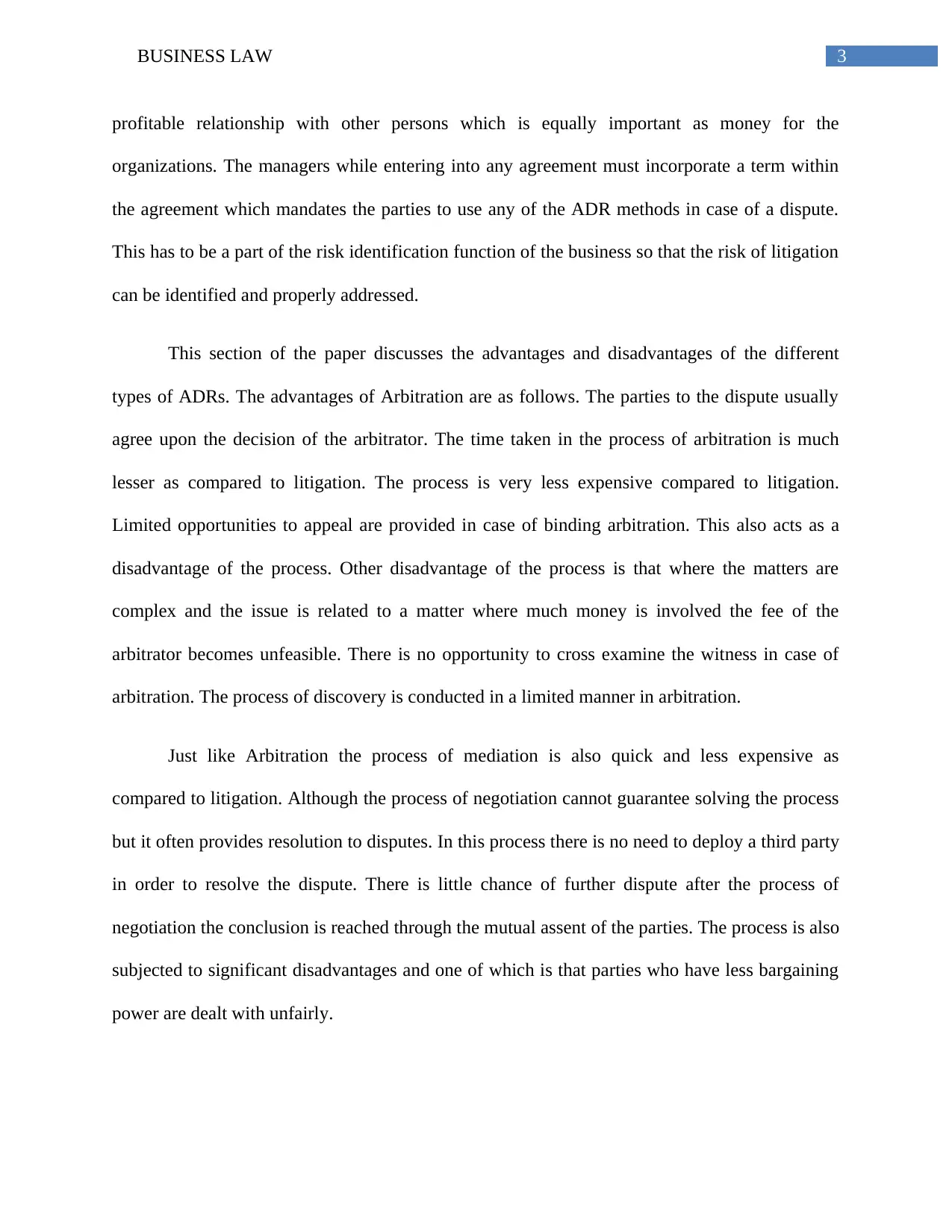
3BUSINESS LAW
profitable relationship with other persons which is equally important as money for the
organizations. The managers while entering into any agreement must incorporate a term within
the agreement which mandates the parties to use any of the ADR methods in case of a dispute.
This has to be a part of the risk identification function of the business so that the risk of litigation
can be identified and properly addressed.
This section of the paper discusses the advantages and disadvantages of the different
types of ADRs. The advantages of Arbitration are as follows. The parties to the dispute usually
agree upon the decision of the arbitrator. The time taken in the process of arbitration is much
lesser as compared to litigation. The process is very less expensive compared to litigation.
Limited opportunities to appeal are provided in case of binding arbitration. This also acts as a
disadvantage of the process. Other disadvantage of the process is that where the matters are
complex and the issue is related to a matter where much money is involved the fee of the
arbitrator becomes unfeasible. There is no opportunity to cross examine the witness in case of
arbitration. The process of discovery is conducted in a limited manner in arbitration.
Just like Arbitration the process of mediation is also quick and less expensive as
compared to litigation. Although the process of negotiation cannot guarantee solving the process
but it often provides resolution to disputes. In this process there is no need to deploy a third party
in order to resolve the dispute. There is little chance of further dispute after the process of
negotiation the conclusion is reached through the mutual assent of the parties. The process is also
subjected to significant disadvantages and one of which is that parties who have less bargaining
power are dealt with unfairly.
profitable relationship with other persons which is equally important as money for the
organizations. The managers while entering into any agreement must incorporate a term within
the agreement which mandates the parties to use any of the ADR methods in case of a dispute.
This has to be a part of the risk identification function of the business so that the risk of litigation
can be identified and properly addressed.
This section of the paper discusses the advantages and disadvantages of the different
types of ADRs. The advantages of Arbitration are as follows. The parties to the dispute usually
agree upon the decision of the arbitrator. The time taken in the process of arbitration is much
lesser as compared to litigation. The process is very less expensive compared to litigation.
Limited opportunities to appeal are provided in case of binding arbitration. This also acts as a
disadvantage of the process. Other disadvantage of the process is that where the matters are
complex and the issue is related to a matter where much money is involved the fee of the
arbitrator becomes unfeasible. There is no opportunity to cross examine the witness in case of
arbitration. The process of discovery is conducted in a limited manner in arbitration.
Just like Arbitration the process of mediation is also quick and less expensive as
compared to litigation. Although the process of negotiation cannot guarantee solving the process
but it often provides resolution to disputes. In this process there is no need to deploy a third party
in order to resolve the dispute. There is little chance of further dispute after the process of
negotiation the conclusion is reached through the mutual assent of the parties. The process is also
subjected to significant disadvantages and one of which is that parties who have less bargaining
power are dealt with unfairly.
Paraphrase This Document
Need a fresh take? Get an instant paraphrase of this document with our AI Paraphraser
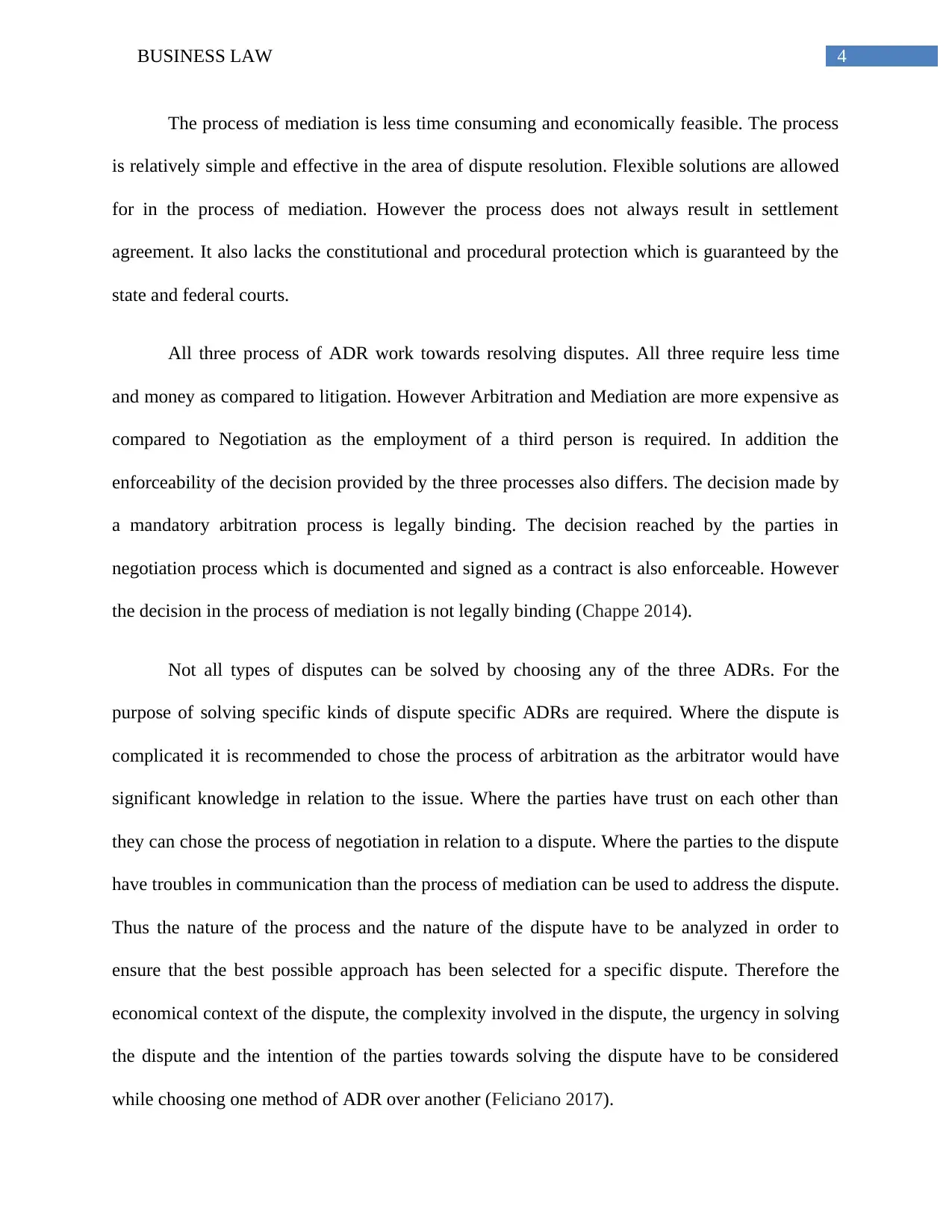
4BUSINESS LAW
The process of mediation is less time consuming and economically feasible. The process
is relatively simple and effective in the area of dispute resolution. Flexible solutions are allowed
for in the process of mediation. However the process does not always result in settlement
agreement. It also lacks the constitutional and procedural protection which is guaranteed by the
state and federal courts.
All three process of ADR work towards resolving disputes. All three require less time
and money as compared to litigation. However Arbitration and Mediation are more expensive as
compared to Negotiation as the employment of a third person is required. In addition the
enforceability of the decision provided by the three processes also differs. The decision made by
a mandatory arbitration process is legally binding. The decision reached by the parties in
negotiation process which is documented and signed as a contract is also enforceable. However
the decision in the process of mediation is not legally binding (Chappe 2014).
Not all types of disputes can be solved by choosing any of the three ADRs. For the
purpose of solving specific kinds of dispute specific ADRs are required. Where the dispute is
complicated it is recommended to chose the process of arbitration as the arbitrator would have
significant knowledge in relation to the issue. Where the parties have trust on each other than
they can chose the process of negotiation in relation to a dispute. Where the parties to the dispute
have troubles in communication than the process of mediation can be used to address the dispute.
Thus the nature of the process and the nature of the dispute have to be analyzed in order to
ensure that the best possible approach has been selected for a specific dispute. Therefore the
economical context of the dispute, the complexity involved in the dispute, the urgency in solving
the dispute and the intention of the parties towards solving the dispute have to be considered
while choosing one method of ADR over another (Feliciano 2017).
The process of mediation is less time consuming and economically feasible. The process
is relatively simple and effective in the area of dispute resolution. Flexible solutions are allowed
for in the process of mediation. However the process does not always result in settlement
agreement. It also lacks the constitutional and procedural protection which is guaranteed by the
state and federal courts.
All three process of ADR work towards resolving disputes. All three require less time
and money as compared to litigation. However Arbitration and Mediation are more expensive as
compared to Negotiation as the employment of a third person is required. In addition the
enforceability of the decision provided by the three processes also differs. The decision made by
a mandatory arbitration process is legally binding. The decision reached by the parties in
negotiation process which is documented and signed as a contract is also enforceable. However
the decision in the process of mediation is not legally binding (Chappe 2014).
Not all types of disputes can be solved by choosing any of the three ADRs. For the
purpose of solving specific kinds of dispute specific ADRs are required. Where the dispute is
complicated it is recommended to chose the process of arbitration as the arbitrator would have
significant knowledge in relation to the issue. Where the parties have trust on each other than
they can chose the process of negotiation in relation to a dispute. Where the parties to the dispute
have troubles in communication than the process of mediation can be used to address the dispute.
Thus the nature of the process and the nature of the dispute have to be analyzed in order to
ensure that the best possible approach has been selected for a specific dispute. Therefore the
economical context of the dispute, the complexity involved in the dispute, the urgency in solving
the dispute and the intention of the parties towards solving the dispute have to be considered
while choosing one method of ADR over another (Feliciano 2017).
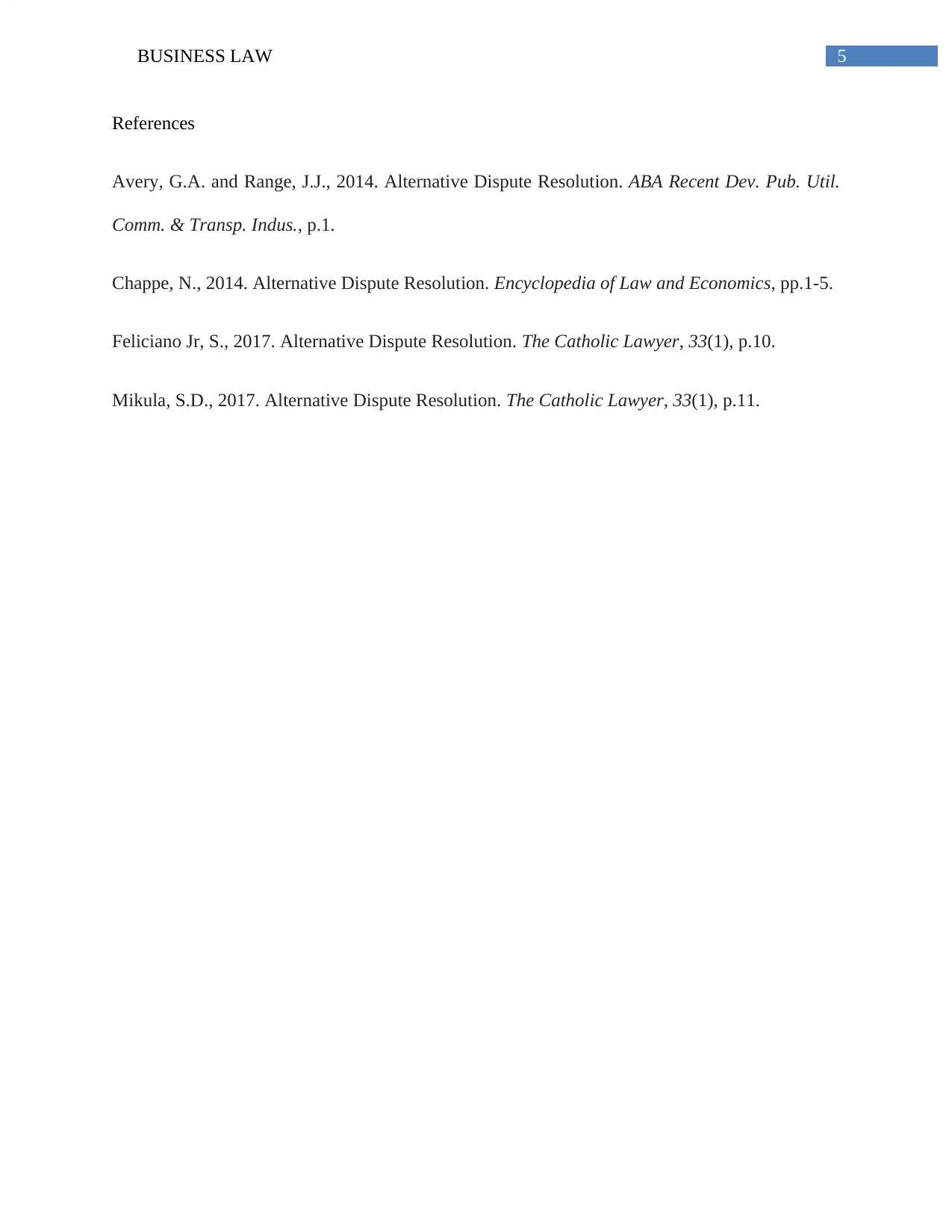
5BUSINESS LAW
References
Avery, G.A. and Range, J.J., 2014. Alternative Dispute Resolution. ABA Recent Dev. Pub. Util.
Comm. & Transp. Indus., p.1.
Chappe, N., 2014. Alternative Dispute Resolution. Encyclopedia of Law and Economics, pp.1-5.
Feliciano Jr, S., 2017. Alternative Dispute Resolution. The Catholic Lawyer, 33(1), p.10.
Mikula, S.D., 2017. Alternative Dispute Resolution. The Catholic Lawyer, 33(1), p.11.
References
Avery, G.A. and Range, J.J., 2014. Alternative Dispute Resolution. ABA Recent Dev. Pub. Util.
Comm. & Transp. Indus., p.1.
Chappe, N., 2014. Alternative Dispute Resolution. Encyclopedia of Law and Economics, pp.1-5.
Feliciano Jr, S., 2017. Alternative Dispute Resolution. The Catholic Lawyer, 33(1), p.10.
Mikula, S.D., 2017. Alternative Dispute Resolution. The Catholic Lawyer, 33(1), p.11.
⊘ This is a preview!⊘
Do you want full access?
Subscribe today to unlock all pages.

Trusted by 1+ million students worldwide
1 out of 6
Related Documents
Your All-in-One AI-Powered Toolkit for Academic Success.
+13062052269
info@desklib.com
Available 24*7 on WhatsApp / Email
![[object Object]](/_next/static/media/star-bottom.7253800d.svg)
Unlock your academic potential
Copyright © 2020–2026 A2Z Services. All Rights Reserved. Developed and managed by ZUCOL.




